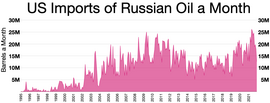A | B | C | D | E | F | G | H | CH | I | J | K | L | M | N | O | P | Q | R | S | T | U | V | W | X | Y | Z | 0 | 1 | 2 | 3 | 4 | 5 | 6 | 7 | 8 | 9
International sanctions have been imposed against Russia and Crimea during the Russo-Ukrainian War by a large number of countries, including the United States, Canada, the European Union, and international organisations following the Russian annexation of Crimea, which began in late February 2014. Belarus has also been sanctioned for its cooperation with and assistance to Russian armed forces.[1] The sanctions were imposed against individuals, businesses, and officials from Russia and Ukraine.[2] Russia responded with sanctions against several countries, including a total ban on food imports from Australia, Canada, Norway, Japan, the United States, the EU and the United Kingdom.[3]
The sanctions contributed to the collapse of the Russian ruble and worsened the economic impact of the 2022 Russian invasion of Ukraine.[4] They also caused economic damage to the EU economy, with total losses estimated at €100 billion (as of 2015[update]).[5] As of 2014[update], Russia's finance minister announced that the sanctions had cost Russia $40 billion, with another $100 billion loss in 2014 due to decrease in the price of oil the same year.[6] Following sanctions imposed in August 2018, economic losses incurred by Russia amounted to around 0.5–1.5% in foregone GDP growth.[7]
As of June 2023[update], sanctions by the European Union and United States continue to be in effect.[8][9] In January 2022, the EU announced the latest extension of sanctions until 31 July 2022.[10] Following Russia's invasion of Ukraine in February 2022, the United States, the EU,[11] and other countries[12] introduced or significantly expanded sanctions to include Vladimir Putin and other government officials.[13] They also cut off selected Russian banks from SWIFT.[14] The 2022 boycott of Russia and Belarus triggered the 2022 Russian financial crisis.
Background
Before the eruption of the Crimean crisis and the War in Donbass, tensions already existed between Russia and the United States over human rights issues. In December 2012, the US enacted the Magnitsky Act, intended to punish Russian officials responsible for the death of Russian tax accountant Sergei Magnitsky in a Moscow prison in 2009 by prohibiting their entry to the US and use of its banking system.[15] 18 individuals were originally affected by the Act. In December 2016, Congress enacted the Global Magnitsky Act to allow the US Government to sanction foreign government officials implicated in human rights abuses anywhere in the world.[16] On 21 December 2017, 13 additional names were added to the list of sanctioned individuals, not just Russians. Other countries passed similar laws to ban foreigners deemed guilty of human rights abuses from entering their countries.
In response to the annexation of Crimea by the Russian Federation and the 2022 Russian invasion of Ukraine, some governments and international organisations, led by the United States and European Union, imposed sanctions on Russian individuals and businesses. As the unrest expanded into other parts of Eastern Ukraine, and later escalated into the ongoing war in the Donbass region, the scope of the sanctions increased.[17]
Overall, three types of sanctions were imposed: ban on provision of technology for oil and gas exploration, ban on provision of credits to Russian oil companies and state banks, travel restrictions on the influential Russian citizens close to President Putin and involved in the annexation of Crimea.[17] The Russian government responded in kind, with sanctions against some Canadian and American individuals and, in August 2014, with a total ban on food imports from the European Union, United States, Norway, Canada and Australia.[18]
Sanctions against Russian and Ukrainian individuals, companies and officials
Sanctioned individuals include notable and high-level central government personnel and businessmen on all sides. In addition, companies suggested for possible involvement in the controversial issues have also been sanctioned.
First round: March/April 2014
On 6 March 2014, U.S. president Barack Obama, invoking, inter alia, the International Emergency Economic Powers Act and the National Emergencies Act, signed an executive order declaring a national emergency and ordering sanctions, including travel bans and the freezing of U.S. assets, against not-yet-specified individuals who had "asserted governmental authority in the Crimean region without the authorization of the Government of Ukraine" and whose actions were found, inter alia, to "undermine democratic processes and institutions in Ukraine".[19][20]
On 17 March 2014, the United States, the European Union, and Canada introduced specifically targeted sanctions,[21][22][23] the day after the disputed Crimean referendum and a few hours before Russian president Vladimir Putin signed a decree recognizing Crimea as an independent state, laying the groundwork for its annexation of Crimea by Russia. The principal EU sanction aimed to "prevent the entry into ... their territories of the natural persons responsible for actions which undermine ... the territorial integrity ... of Ukraine, and of natural persons associated with them, as listed in the Annex".[21] The EU imposed its sanctions "in the absence of de-escalatory steps by the Russian Federation" in order to bring an end to the violence in eastern Ukraine. The EU at the same time clarified that the union "remains ready to reverse its decisions and reengage with Russia when it starts contributing actively and without ambiguities to finding a solution to the Ukrainian crisis".[24]
These 17 March sanctions were the most wide-ranging sanctions used against Russia since the 1991 fall of the Soviet Union.[25] Japan also announced sanctions against Russia, which included the suspension of talks regarding military matters, space, investment, and visa requirements.[26] A few days later, the US government expanded the sanctions.[27]
On 19 March, Australia imposed sanctions against Russia after its annexation of Crimea. These sanctions targeted financial dealings and travel bans on those who have been instrumental in the Russian threat to Ukraine's sovereignty.[28] Australian sanctions were expanded on 21 May.[29]
In early April, Albania, Iceland and Montenegro, as well as Ukraine, imposed the same restrictions and travel bans as those of the EU on 17 March.[30] Igor Lukšić, foreign minister of Montenegro, said that despite a "centuries old-tradition" of good ties with Russia, joining the EU in imposing sanctions had "always been the only reasonable choice".[31] Slightly earlier in March, Moldova imposed the same sanctions against former president of Ukraine Viktor Yanukovych and a number of former Ukrainian officials, as announced by the EU on 5 March.[32]
In response to the sanctions introduced by the United States and the European Union, the State Duma (Lower House of the Russian parliament) unanimously passed a resolution asking for all members of the Duma be included on the sanctions list.[citation needed] The sanctions were expanded to include prominent Russian businessmen and women a few days later.[33]
Second round: April 2014
On 10 April, the Council of Europe suspended the voting rights of Russia's delegation.[34]
On 28 April, the United States imposed a ban on business transactions within its territory on seven Russian officials, including Igor Sechin, executive chairman of the Russian state oil company Rosneft, and 17 Russian companies.[35][36]
On the same day, the EU issued travel bans against a further 15 individuals.[37] The EU also stated the aims of EU sanctions as:
sanctions are not punitive, but designed to bring about a change in policy or activity by the target country, entities or individuals. Measures are therefore always targeted at such policies or activities, the means to conduct them and those responsible for them. At the same time, the EU makes every effort to minimise adverse consequences for the civilian population or for legitimate activities.[38]
Third round: 2014–2021
2014
In response to the escalating War in Donbass, on 17 July 2014 the United States extended its transactions ban to two major Russian energy firms, Rosneft and Novatek, and to two banks, Gazprombank and Vnesheconombank.[39] United States also urged EU leaders to join the third wave[40] leading EU to start drafting European sanctions a day before.[41][42] On 25 July, the EU officially expanded its sanctions to an additional 15 individuals and 18 entities,[43] with an additional eight added on 30 July.[44] On 31 July 2014 the EU introduced the third round of sanctions which included an embargo on arms and related material, and embargo on dual-use goods and technology intended for military use or a military end user, a ban on imports of arms and related material, controls on export of equipment for the oil industry, and a restriction on the issuance of and trade in certain bonds, equity or similar financial instruments on a maturity greater than 90 days (In September 2014 lowered to 30 days)[45]
On 24 July 2014, Canada targeted Russian arms, energy and financial entities.[46] On 5 August 2014, Japan froze the assets of "individuals and groups supporting the separation of Crimea from Ukraine" and restrict imports from Crimea and froze funds for new projects in Russia in line with the policy of the EBRD.[47] On 8 August 2014, Australia announced that Australia is "working towards" tougher sanctions against Russia.[48][49]
On 12 August 2014, Norway adopted the tougher sanctions against Russia that were imposed by the European Union and the United States on 12 August 2014. The Norwegian foreign minister Børge Brende said that it would also impose restrictions similar to the EU's 1 August sanctions. Russian state-owned banks will be banned from taking long-term and mid-term loans, arms exports will be banned and supplies of equipment, technology and assistance to the Russian oil sector will be prohibited.[50]
On 14 August 2014, Switzerland expanded sanctions against Russia over its threat to Ukraine's sovereignty. Swiss government added 26 more Russians and pro-Russian Ukrainians to the list.[51] The Swiss government said it is expanding measures to prevent the circumvention of sanctions relating to the situation in Ukraine to include the third round of sanctions imposed by the EU in July and also stated that five Russian banks will require authorisation to issue long-term financial instruments in Switzerland.[52] On 28 August 2014, Switzerland amended its sanctions to include the sanctions imposed by the EU in July.[52]
On 14 August 2014, Ukraine passed a law introducing Ukrainian sanctions against Russia.[53][54] The law includes 172 individuals and 65 entities in Russia and other countries for supporting and financing "terrorism" in Ukraine, though actual sanctions would need approval from Ukraine's National Security and Defense Council.
On 11 September 2014, US president Obama said that the United States would join the EU in imposing tougher sanctions on Russia's financial, energy and defence sectors.[55] On 12 September 2014, the United States imposed sanctions on Russia's largest bank (Sberbank), a major arms maker and arctic (Rostec), deepwater and shale exploration by its biggest oil companies (Gazprom, Gazprom Neft,[56][57][58] Lukoil, Surgutneftegas and Rosneft). Sberbank and Rostec will have limited ability to access the US debt markets. The sanction on the oil companies seek to ban co-operation with Russian oil firms on energy technology and services by companies including Exxon Mobil Corp. and BP Plc.[59]
On 24 September 2014, Japan banned the issue of securities by 5 Russian banks and also tightened restrictions on defence exports to Russia.[60]
On 3 October 2014, US vice president Joe Biden said that "It was America's leadership and the president of the United States insisting, ofttimes almost having to embarrass Europe to stand up and take economic hits to impose costs" and added that "And the results have been massive capital flight from Russia, a virtual freeze on foreign direct investment, a ruble at an all-time low against the dollar, and the Russian economy teetering on the brink of recession. We don't want Russia to collapse. We want Russia to succeed. But Putin has to make a choice. These asymmetrical advances on another country cannot be tolerated. The international system will collapse if they are."[61]
On 18 December 2014, the EU banned some investments in Crimea, halting support for Russian Black Sea oil and gas exploration and stopping European companies from purchasing real estate or companies in Crimea, or offering tourism services.[62] On 19 December 2014, US president Obama imposed sanctions on Russian-occupied Crimea by executive order prohibiting exports of US goods and services to the region.[63]
Sanctions specific to Crimea
The United States, Canada, the European Union, and other European countries (including Ukraine) imposed economic sanctions specifically targeting Crimea. Sanctions prohibit the sale, supply, transfer, or export of goods and technology in several sectors, including services directly related to tourism and infrastructure. They list seven ports where cruise ships cannot dock.[64][65][66][67] Sanctions against Crimean individuals include travel bans and asset freezes. Visa and MasterCard have stopped service in Crimea between December 2014 and April 2015.[citation needed]
2015 - 2017
On 16 February 2015, the EU increased its sanction list to cover 151 individuals and 37 entities.[68] Australia indicated that it would follow the EU in new sanctions.
On 18 February 2015, Canada added 37 Russian citizens and 17 Russian entities to its sanction list. Rosneft and the deputy minister of defence, Anatoly Antonov, were both sanctioned.[69][70] In June 2015 Canada added three individuals and 14 entities, including Gazprom.[71] Media suggested the sanctions were delayed because Gazprom was a main sponsor of the 2015 FIFA Women's World Cup then concluding in Canada.[72]
In September 2015, Ukraine sanctioned more than 388 individuals, over 105 companies and other entities. In accordance with the August 2015 proposals promulgated by the Security Service of Ukraine and the Order of the Cabinet of Ministers of Ukraine No. 808-p dated 12 August 2015, Ukraine, on 2 September 2015, declared Russia an enemy of Ukraine. Also on 16 September 2015, the Ukrainian president Petro Poroshenko issued a decree that named nearly 400 individuals, more than 90 companies and other entities to be sanctioned for the Russia's "criminal activities and aggression against Ukraine."[73][74][75][76]
In April 2016, Lithuania sanctioned 46 individuals who were involved in the detention and sentencing of Ukrainian citizens Nadiya Savchenko, Oleh Sentsov, and Olexandr Kolchenko. Lithuanian foreign minister Linas Linkevičius said that his country wanted to "focus attention on the unacceptable and cynical violations of international law and human rights in Russia. It would be more effective if the blacklist became Europe-wide. We hope to start such a discussion."[77]
On 29 December 2016, the US president Barack Obama signed an Executive Order that expelled 35 Russian diplomats, locked down two Russian diplomatic compounds, and expanded sanctions against Russia for its interference in the 2016 United States elections.[78][79][80][81]
In August 2017, the US Congress enacted the Countering America's Adversaries Through Sanctions Act that imposed new sanctions on Russia for interference in the 2016 elections and its involvement in Ukraine and Syria. The act converted the punitive measures previously imposed by executive orders into law to prevent the president easing, suspending or ending of sanctions without the approval of Congress.[82][83]
2018
On 15 March 2018, Trump imposed financial sanctions under the act on the 13 Russian government hackers and front organizations that had been indicted by Mueller's investigation into Russian interference in the 2016 United States elections.[84] On 6 April 2018, the United States imposed economic sanctions on seven Russian oligarchs and 12 companies they control, accusing them of "malign activity around the globe", along with 17 top Russian officials, the state-owned weapons-trading company Rosoboronexport and the Russian Financial Corporation Bank (RFC Bank). High-profile names on the list include Oleg Deripaska and Kiril Shamalov, Putin's ex-son-in-law, who married Putin's daughter Katerina Tikhonova in February 2013. The press release stated: "Deripaska has been investigated for money laundering, and has been accused of threatening the lives of business rivals, illegally wiretapping a government official, and taking part in extortion and racketeering. There are also unsubstantiated allegations that Deripaska bribed a government official, ordered the murder of a businessman in the 1990's, and had links to a Russian organized crime group."[85]
Other names on the list include: Oil tycoon Vladimir Bogdanov, Suleyman Kerimov, who faced money-laundering charges in France for allegedly bringing hundreds of millions of euros into the country without reporting the money to tax authorities, Igor Rotenberg, principal owner of Russian oil and gas drilling company Gazprom Burenie, Andrei Skoch, a deputy in the State Duma. U.S. officials said he has longstanding ties to Russian organized criminal groups, Viktor Vekselberg, founder and chairman of the Renova Group, asset management company,[85][86] and Aleksandr Torshin.[87]
In August 2018, following the poisoning of Sergey Skripal, the U.S. Department of Commerce imposed further sanctions on dual-use exports to Russia which were deemed to be sensitive on national security grounds, including gas turbine engines, integrated circuits, and calibration equipment used in avionics. Until that moment, such exports were considered on a case-by-case basis. Following the introduction of these sanctions, the default position is of denial.[88] Also, on September that year a list of companies in the space and defense industry came under sanctions, including: AeroComposit, Divetechnoservices, Scientific-Research Institute "Vektor", Nilco Group, Obinsk Research and Production Enterprise, Aviadvigatel, Information Technology and Communication Systems (Infoteks), Scientific and Production Corporation of Precision Instruments Engineering and Voronezh Scientific Research Institute "Vega", whom are forbidden from doing business with.[89]
2019
In March 2019, the United States imposed sanctions on persons and companies involved in the Russian shipbuilding industry in response to the Kerch Strait incident: Yaroslavsky Shipbuilding Plant, Zelenodolsk Shipyard Plant, AO Kontsern Okeanpribor, PAO Zvezda (Zvezda), AO Zavod Fiolent (Fiolent), GUP RK KTB Sudokompozit (Sudokompozit), LLC SK Consol-Stroi LTD and LLC Novye Proekty. Also, the U.S. targeted persons involved in the 2018 Donbass general elections.[90]
On 2 August 2019, the U.S State Department announced additional sanctions together with an executive order signed by President Trump which gives the Department of Treasury and the Department of Commerce the authority to implement the sanctions. The sanctions forbid granting Russia loans or other assistance from international financial institutions, prohibition on U.S banks buy non-ruble denominated bonds issued by the Russia after 26 August and lending non-ruble denominated funds to Russia and licensing restrictions for exports of items for chemical and biological weapons proliferation reasons.[91]
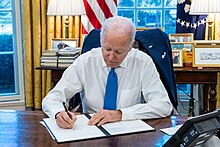
In September 2019, pursuant to Executive Order 13685 Maritime Assistance LLC was placed under sanctions due to its export of fuel to Syria as well as for providing support to Sovfracht, another company sanctioned for operating in Crimea.[92] Later in the same month, the United States sanctioned two Russian citizens as well as three companies, Autolex Transport, Beratex Group and Linburg Industries in connection with the Russian interference in the 2016 United States election.[93]
Fourth round: 2022
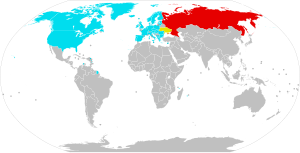
After Russia invaded Ukraine on 24 February 2022, two countries that had not previously taken part in sanctions, namely South Korea[94] and non-UN member state Taiwan,[95] engaged in sanctions against Russia. On 28 February 2022, Singapore announced that it will impose banking sanctions against Russia for the invasion of Ukraine, thus making it the first country in Southeast Asia to impose sanctions upon Russia;[96] the move was described by the South China Morning Post as being "almost unprecedented". The sanctions also included materials that could be used for weapons against Ukraine, as well as electronics, technology devices and other related equipment, which were listed in a detailed statement on 5 March.[97][98]
On 28 February 2022, the Central Bank of Russia was blocked from accessing more than $400 billion in foreign-exchange reserves held abroad[99][100] and the EU imposed sanctions on several Russian oligarchs and politicians.[101] Bjoern Seibert, head of European Commission President Ursula von der Leyen's Cabinet, was in charge of leading the EU's negotiations with the US on the sanction's implementation.[102]
Sergei Aleksashenko, the former Russian deputy finance minister, said: "This is a kind of financial nuclear bomb that is falling on Russia."[103] On 1 March 2022, the French finance minister Bruno Le Maire said the total amount of Russian assets being frozen by sanctions amounted to $1 trillion.[104]
Serbia, Mexico and Brazil have announced that they would not be participating in any economic sanctions against Russia.[105][106][107][108]
Western countries and others began imposing limited sanctions on Russia when it recognised the independence of Donbas.[citation needed] With the commencement of attacks on 24 February, a large number of other countries began applying sanctions with the aim of crippling the Russian economy. The sanctions were wide-ranging, targeting individuals, banks, businesses, monetary exchanges, bank transfers, exports, and imports.[11][12][109]
In February 2022, President Joe Biden signed Executive Order 14065 of February 21, 2022 — "Blocking Property of Certain Persons and Prohibiting Certain Transactions With Respect to Continued Russian Efforts To Undermine the Sovereignty and Territorial Integrity of Ukraine".
Faisal Islam of BBC News stated that the measures were far from normal sanctions and were "better seen as a form of economic war". The intent of the sanctions was to push Russia into a deep recession with the likelihood of bank runs and hyperinflation. Islam noted that targeting a G20 central bank in this way had never been done before.[110] Deputy Chairman of the Security Council of Russia and former president Dmitry Medvedev derided Western sanctions imposed on Russia, including personal sanctions, and commented that they were a sign of "political impotence" resulting from NATO's withdrawal from Afghanistan. He threatened to nationalise foreign assets that companies held inside Russia.[111]
On 14 March 2022, Biden's national security advisor Jake Sullivan warned China that it would face consequences if it helped Russia evade sanctions.[112]
A year after Russia's invasion of Ukraine, the United States persuaded countries like Turkey and the United Arab Emirates to crack down on the commercial activities in their countries which had been helping Russia's war efforts in Ukraine. These countries did not back the western sanctions imposed on Russia, instead continuing to trade with it and providing havens for wealthy Russians and their capital.[113] The United States marked the first anniversary of Russia's invasion of Ukraine on February 24, 2023, with new sanctions against Russia aimed at undermining Moscow's ability to launch a war. The new measures by the US Treasury Department affect 22 Russian individuals and 83 entities, adding to the more than 2,500 sanctions imposed last year.[114]
11th round: June 2023
Since April 2014, the European Union has applied eleven rounds of sanctions against the Russian Federation. The most recent 11th round of sanctions in June 2023 focused on dual-use items, including computer chips, and as well as an attempt to limit ship-to-ship transactions of sanctioned goods. More suspensions of Russian broadcasting licenses in Europe were also announced.[115]
The most recent measures included transport measures, including a full ban on Russian trucks and semi-trailers, limitations on ship-to-ship transfer taking place in the Exclusive Economic Zone of a member state or within 12 nautical miles from the baseline of that member state's coast, a total ban on Russian pipeline oil transfers through the northern branch of the Druzhba pipeline to Germany and Poland, new export and export restrictions on Russia's defense materials as well as goods and technology suited for use in the aerospace industry and jet fuel and fuel additives. Sanctions were also imposed on Russian intellectual property rights and their transfer as well as new criteria on sanctions in the Russian IT-sector with a license issued by the Russian Federal Security Service (FSB) and the Russian Ministry of Industry and Trade.[116]
Oil
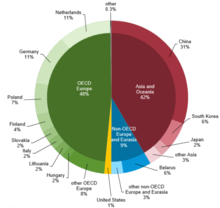
Senator Roger Marshall introduced a bill on 1 March 2022 banning US imports of Russian oil, supported by the GOP minority leader of the Senate Committee on Energy and Natural Resources and seven other Republicans. The first move by a Western nation to impose a flat blockade on Russian petroleum, its top moneymaker, came a day prior from Canada. President Justin Trudeau said that it "sends a powerful message."[118][119] On 8 March, President Joe Biden ordered a ban on imports of oil, gas and coal from Russia to the US.[120]
-
US imports of Russian oil by month before ban
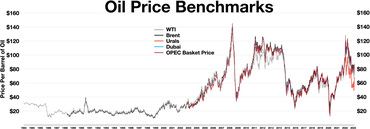
On September 2, 2022, the G7 group of nations agreed to cap the price of Russian oil in order to reduce Russia's ability to finance its war with Ukraine without further increasing inflation.[121] Joined by the European Union and Australia, the sanctions come into effect on 5 December 2022.[122] From 5 February 2023 an oil products price cap came into effect.
The EU banned all imports of refined oil products from Russia in February 2023, the UK banned Russian oil imports from December 2022.[123] EU imports of oil by ship have fallen by 1.2m bpd to under 0.1m bpd.[124]
Russia's oil and gas revenue for Q1 of 2023 was 1.6 trillion rubles ($19.61 billion), far below the budget for 2023 of 8.9 trillion roubles ($35 billion) per quarter and the 2022 revenue which averaged $42 billion per quarter.[125][126]
Banking
In a 22 February speech,[127] US president Joe Biden announced restrictions against four Russian banks, including V.E.B., as well as on corrupt billionaires close to Putin.[128][129] UK prime minister Boris Johnson announced that all major Russian banks would have their assets frozen and be excluded from the UK financial system, and that some export licences to Russia would be suspended.[130] He also introduced a deposit limit for Russian citizens in UK bank accounts, and froze the assets of over 100 additional individuals and entities.[131]
The foreign ministers of the Baltic states called for Russia to be cut off from SWIFT, the global messaging network for international payments. Concern was expressed in Europe because European lenders held most of the nearly $30 billion in foreign banks' exposure to Russia and because China had developed an alternative to SWIFT called CIPS; a weaponisation of SWIFT would provide greater impetus to the development of CIPS which, in turn, could weaken SWIFT.[132][133] Other leaders calling for Russia to be stopped from accessing SWIFT include Czech president Miloš Zeman,[134] and UK prime minister Boris Johnson.[135] On 26 February, the German foreign minister Annalena Baerbock and economy minister Robert Habeck made a joint statement backing targeted restrictions of Russia from SWIFT.[136][137] Shortly thereafter, it was announced that major Russian banks would be removed from SWIFT, although there would still be limited accessibility to ensure the continued ability to pay for gas shipments.[138]
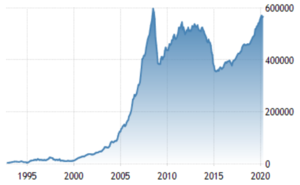
It was also announced that the West would place sanctions on the Russian Central Bank, which holds $630bn in foreign reserves, to prevent it from liquidating assets to offset the impact of sanctions.[140]
On 26 February, two Chinese state banks—the Industrial and Commercial Bank of China, which is the largest bank in the world, and the Bank of China, which is the country's biggest currency trader—were limiting financing to purchase Russian raw materials, which was limiting Russian access to foreign currency.[141] On 28 February, Switzerland and Monaco froze a number of Russian assets and joined EU sanctions. According to Ignazio Cassis, the president of the Swiss Confederation, the decision was unprecedented but consistent with Swiss neutrality.[142][143]
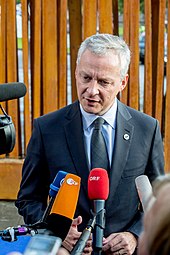
Singapore became the first Southeast Asian country to impose sanctions on Russia by restricting banks and transactions linked to Russia;[145] the move was described by the South China Morning Post as being "almost unprecedented".[146]
On 28 February, Japan announced that its central bank would join sanctions by limiting transactions with Russia's central bank.[147] The Central Bank of Russia was blocked from accessing more than $400 billion in foreign-exchange reserves held abroad.[99][148] Sergei Aleksashenko, the former Russian deputy finance minister, said: "This is a kind of financial nuclear bomb that is falling on Russia."[149] EU foreign affairs chief Josep Borrell said that Western governments "cannot block the reserves of the Russian central bank in Moscow or in China".[150]
On 1 March, the French finance minister Bruno Le Maire said that Russian assets being frozen by sanctions amounted to $1 trillion.[151] South Korea announced it would stop all transactions with 7 main Russian banks and their affiliates, restrict the purchase of Russian treasury bonds, and agreed to "immediately implement" and join any further economics sanctions imposed against Russia by the European Union.[152][153]
Following sanctions and criticisms of their relations with Russian business, many companies chose to exit Russian or Belarusian markets voluntarily or in order to avoid potential future sanctions.[154] Visa, Mastercard, and American Express independently blocked Russian banks as of 2 March.[155] Following Swiss sanctions on Russia, Credit Suisse issued orders to destroy documents linking Russian oligarchs to yacht loans, a move which led to considerable criticism.[156]
In July 2023 Russia attempted to get the SWIFT ban partially lifted by making it a condition to extending the Black Sea Grain Initiative.[157]
The ruble
In 2013 there were around 35 rubles to the US dollar. Following the seizure of Crimea and sanctions starting, the ruble fell. In 2015-2019 it traded in the 60-70 range. In 2020-2021 it moved to the 70-80 range and since the 2022 invasion of Ukraine and a large increase in sanctions, it has slowly declined to reach 100 in August 2023.[158]
Dual-use ban
The US instituted export controls, a novel sanction focused on restricting Russian access to high-tech components, both hardware and software, made with any parts or intellectual property from the US. The sanction required that any person or company that wanted to sell technology, semiconductors, encryption software, lasers, or sensors to Russia request a licence, which by default was denied. The enforcement mechanism involved sanctions against the person or company, with the sanctions focused on the shipbuilding, aerospace, and defence industries.[159][160]
EU sanctions
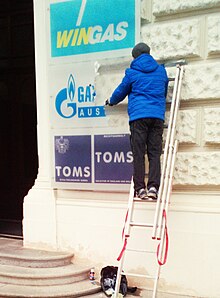
On the morning of 24 February, Ursula von der Leyen, the president of the European Commission, announced "massive" EU sanctions to be adopted by the union. The sanctions targeted technological transfers, Russian banks, and Russian assets.[161] Josep Borrell, the High Representative of the Union for Foreign Affairs and Security Policy, stated that Russia would face "unprecedented isolation" as the EU would impose the "harshest package of sanctions ever implemented". He also said that "these are among the darkest hours of Europe since the Second World War".[162] President of the European Parliament Roberta Metsola called for "immediate, quick, solid and swift action" and convened an extraordinary session of Parliament for 1 March.[163][164]
In May 2022, the European Commission proposed and approved a partial ban on oil imports from Russia,[165][166] part of the economic response to the Russian invasion of Ukraine.[167]
European sanctions are imposed according to Decision 2014/145/CFSP[168] of the European Council and EU Regulation 269/2014,[169] which authorize the freezing of assets.
Josep Borrell said he wants EU countries to confiscate frozen foreign-exchange reserves of the Russian central bank —which amount to over $300 billion— to cover the costs of rebuilding Ukraine after the war. Russian Deputy Foreign Minister Alexander Grushko remarked that Borrell's initiative amounted to "complete lawlessness" and said it would hurt Europe if adopted.[170][171] In June 2023, Christine LaGarde, President of the European Central Bank countered EU President, Ursula von der Leyen's plan to use confiscated Russian assets for rebuilding war-torn Ukraine. Such a plan would "undermine the legal and economic foundations of the Euro internationally", according to LaGarde.[172]
Since February 2022, the European Union has sanctioned exports to the Russian Federation at a total value of €43.9 billion and imports to the EU worth €91.2 billion, including financial and legal services.[173]
European impoundment of ships
A 5 April 2022 article by Insider claims the total cost of yachts impounded throughout Europe be over $2 billion. This amount includes the motoryacht Tango, seized pursuant to United States sanctions with Spanish assistance.[174]
- France
On 26 February, the French Navy intercepted Russian cargo ship Baltic Leader in the English Channel. The ship was suspected of belonging to a company targeted by the sanctions. The ship was escorted to the port of Boulogne-sur-Mer and was being investigated.[175]
On 2 March 2022, French customs officials seized the yacht Amore Vero at a shipyard in La Ciotat. The Amore Vero is believed to be owned by the sanctioned oligarch Igor Sechin.[176] Two yachts belonging to Alexei Kuzmichevof Alfa Bank were seized by France on March 24.[177]
- Germany
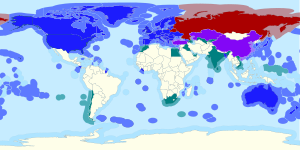
On 2 March 2022, German authorities immobilized Dilbar, owned by Alisher Usmanov.[180][181] She is reported to have cost $800 million, employ 84 full-time crew members, and contain the largest indoor swimming pool installed on a superyacht at 180 cubic metres.[182]
- Greece
On 19 April 2022, Greece announced the seizure of the Russian-flagged petroleum tanker ship Pegas, which docked at Karystos after encountering rough seas. The seizure applies solely to the ship and not its cargo.[183]
- Italy
On 4 March, Italian police impounded Lady M. Authorities believe the ship is owned by Alexei Mordashov.[184] The same day, Italian police seized the yacht of Gennady Timchenko, Lena, in the port city of Sanremo.[185] The yacht was also placed on a United States sanctions list.[186] On 12 March 2022, Italian authorities in the port of Trieste seized the sailing yacht A, known to be owned by Andrey Melnichenko. A spokesperson for Melnichenko vowed to contest the seizure.[187]
- Netherlands
On 6 April 2022, Dutch Minister of Foreign Affairs Wopke Hoekstra sent a letter on the subject of sanctions addressed to the House of Representatives. In it, he reported that while no Russian superyachts were at anchor in the Netherlands, twelve yachts under construction across five shipyards were immobilized to ascertain ownership, including possible beneficial ownership.[188]
- Spain
In March 2022, the Spanish Ministry of Development (known by its acronym "MITMA") detained three yachts pending investigation into whether their true owners are individuals sanctioned by the European Union. Valerie is detained in the Port of Barcelona; Lady Anastasia in Port Adriano in Calvià, Mallorca; and Crescent in the Port of Tarragona.[189][190][191]
- United Kingdom
On 29 March 2022, Grant Shapps, the British secretary of state for transport, announced the National Crime Agency's seizure of Phi. The yacht was docked at Canary Wharf and was about to leave.[192]
Opposition to sanctions

Countries on Russia's "Unfriendly Countries List". Countries and territories on the list have imposed or joined sanctions against Russia.[193]
Italy, Hungary, Greece, France, Cyprus and Slovakia were among the EU states most skeptical about the early sanctions and called for review of sanctions.[194] The Hungarian prime minister Viktor Orbán stated that Europe "shot itself in the foot" by introducing economic sanctions.[195] Bulgarian prime minister Boyko Borisov stated, "I don't know how Russia is affected by the sanctions, but Bulgaria is affected severely".[196] Czech president Miloš Zeman[197][better source needed] and Slovak prime minister Robert Fico[198] also said that the sanctions should be lifted.
Several countries including Greek prime minister Alexis Tsipras and German economy minister Sigmar Gabriel believed dialogue rather than sanctions would be better.[199][200]
Paolo Gentiloni, the Italian minister of foreign affairs, said that the sanctions "are not the solution to the conflict".[201] In January 2017, Swiss economics minister and former president of Switzerland Johann Schneider-Ammann stated his concern about the sanctions' harm to the Swiss economy, and expressed hope that they will soon come to an end.[202] Some companies, most notably Siemens Gas Turbine Technologies LLC and Lufthansa Service Holding were reported to attempt bypassing the sanctions and exporting power generation turbines to the annexed Crimea.[203]
In August 2015, the British think tank Bow Group released a report on sanctions, calling for the removal of them. According to the report, the sanctions have had "adverse consequences for European and American businesses, and if they are prolonged... they can have even more deleterious effects in the future"; the potential cost of sanctions for the Western countries has been estimated as over $700 billion.[204]
In June 2017, Germany and Austria criticized the U.S. Senate over new sanctions against Russia that target the planned Nord Stream 2 gas pipeline from Russia to Germany,[205][206] stating that the United States was threatening Europe's energy supplies (see also Russia in the European energy sector).[207] In a joint statement Austria's chancellor Christian Kern and Germany's foreign minister Sigmar Gabriel said that "Europe's energy supply is a matter for Europe, and not for the United States of America."[208] They also said: "To threaten companies from Germany, Austria and other European states with penalties on the U.S. market if they participate in natural gas projects such as Nord Stream 2 with Russia or finance them introduces a completely new and very negative quality into European-American relations."[209]
Nations and individuals that oppose sanctions against Russia state that sanctions do not generally result in a change in the policies of the sanctioned nation[210][211] and that sanctions mostly hurt the civilian population who have little control over the issues pertaining to foreign policy.[212][213]
2022 to date
In March 2022, China expressed opposition to sanctions against Russia as punishment for invading Ukraine.[214] No country in Africa, Latin America or the Middle East has imposed sanctions on Russia.[215]
As part of the sanctions imposed on Russia, on 2 September 2022, the finance ministers of the G7 group agreed to cap the price of Russian oil and petroleum products, designed to allow Russia to maintain production but limiting the revenue from oil sales.[216][217] In October 2022, India (the world's third-largest oil importer) announced it would not join the effort to cap the price of Russian oil. India obtains Russian crude at a significant discount, and regards Russia as a strategic, economic partner.[218] In 2022, Turkish President Recep Tayyip Erdoğan said that Turkey could not join sanctions against Russia due to import dependence.[219] Turkey bought almost half of its gas from Russia.[220]
Hungary continues to be opposed to sanctions and blocks some sanctions that the EU wishes to put in place.[221]
Efforts to lift sanctions
Some efforts were made to try to lift sanctions.
France announced in January 2016 that it wanted to lift the sanctions in mid-2016. Earlier, U.S. Secretary of State John Kerry mentioned a possible lifting of sanctions.[222]
As Trump's National Security Advisor, Michael T. Flynn was an important link in the connections between Putin and Trump in the "Ukraine peace plan", an unofficial plan "organized outside regular diplomatic channels....at the behest of top aides to President Putin". This plan, aimed at easing the sanctions imposed on Russia, progressed from Putin and his advisors to Ukrainian politician Andrey Artemenko, Felix Sater, Michael Cohen, and Flynn, where he would have then presented it to Trump. The New York Times reported that Sater delivered the plan "in a sealed envelope" to Cohen, who then passed it on to Flynn in February 2017, just before his resignation.[223]
The EU repeatedly extended sanctions[224]
In November 2017, the Secretary General of the Council of Europe Thorbjørn Jagland said that the Council of Europe considered lifting the sanctions on Russia due to concerns that Russia may leave the organization, which would be "a big step back for Europe".[225] Jagland was also criticized of "caving in to blackmail" by other Council members for his conciliatory approach to Russia.[225]
On 8 March 2019, the Italian prime minister Giuseppe Conte stated that Italy is working on lifting the sanctions, which "the ruling parties in Rome say are ineffective and hurt the Italian economy".[226]
Calls by almost all western leaders to remove sanctions ceased after the 2022 Russian invasion of Ukraine.
Other actions not linked directly to sanctionsedit
Air traveledit
The UK closed its airspace to Russia aircraft the day after the invasion of Ukraine, swiftly followed by the EU, Canada and the USA.[227]
Diplomatic actionsedit
In March 2018, 29 Western countries and NATO expelled in total at least 149 Russian diplomats, including 60 by the United States, in response to the poisoning of Skripal and his daughter on 4 March in the United Kingdom, which has been blamed on Russia.[228] Other measures were also taken.
Shortly after the 2022 invasion of Ukraine a co-ordinated action was taken by the west with over 600 Russian diplomats being declared personae non gratae, 400 were believed to be spies.[229]
Turkish control of transiting ships to/from the Black Seaedit
Turkish Foreign Minister Mevlüt Çavuşoğlu announced on 27 February that his government would legally recognise the Russian invasion as a "war", which provides grounds for implementing the Montreux Convention Regarding the Regime of the Straits blocking the transit of Russian Federation and Ukrainian military vessels into/from the Black Sea.[230]
Independent company actionsedit
Following sanctions and negative sentiment towards engaging in Russian business, many companies have chosen to exit Russians or Belarusian markets voluntarily or in order to avoid potential future sanctions.[154] Visa, Mastercard and American Express independently blocked Russian banks as of March 2.[231] Jeffrey Sonnenfeld and colleagues at the Yale School of Management have produced, and are keeping updated, a detailed list tracking those companies which have exited the Russian market, which have reduced their operations there, or which have chosen to remain.[232]
Companies have experienced difficulties exiting Russia, a study from Yale in July 2023 found that of 1,000 companies pledging to leave Russia, just over half managed to make a clean break, with many others having scaled down activities. The highest cost of leaving being borne by energy and utility companies.[233]
By December 2022, after a mass exodus, the only foreign car manufacturers in Russia are Chinese.[234]
Zdroj:https://en.wikipedia.org?pojem=International_sanctions_during_the_Ukrainian_crisis
>Text je dostupný pod licencí Creative Commons Uveďte autora – Zachovejte licenci, případně za dalších podmínek. Podrobnosti naleznete na stránce Podmínky užití.
Text je dostupný za podmienok Creative
Commons Attribution/Share-Alike License 3.0 Unported; prípadne za ďalších
podmienok.
Podrobnejšie informácie nájdete na stránke Podmienky
použitia.
